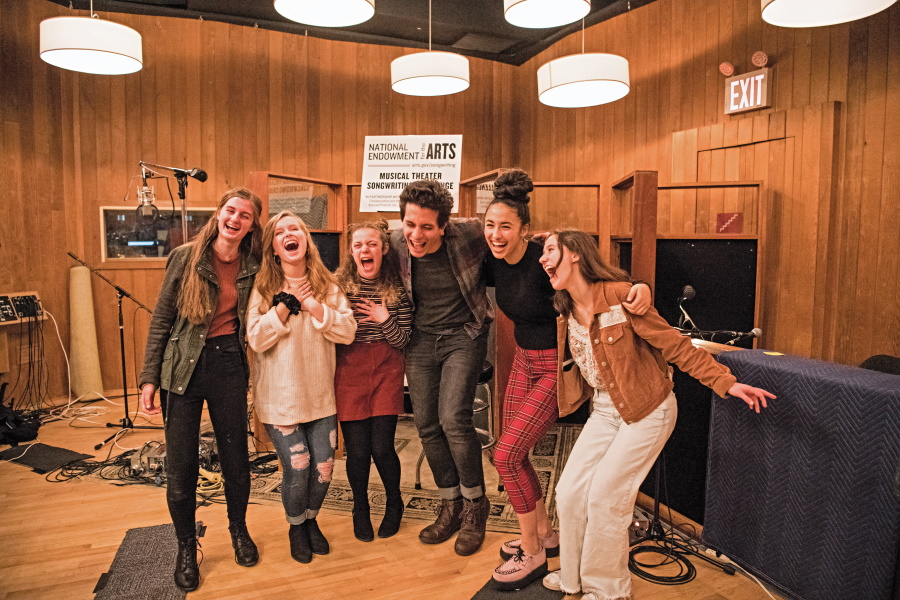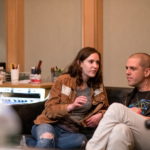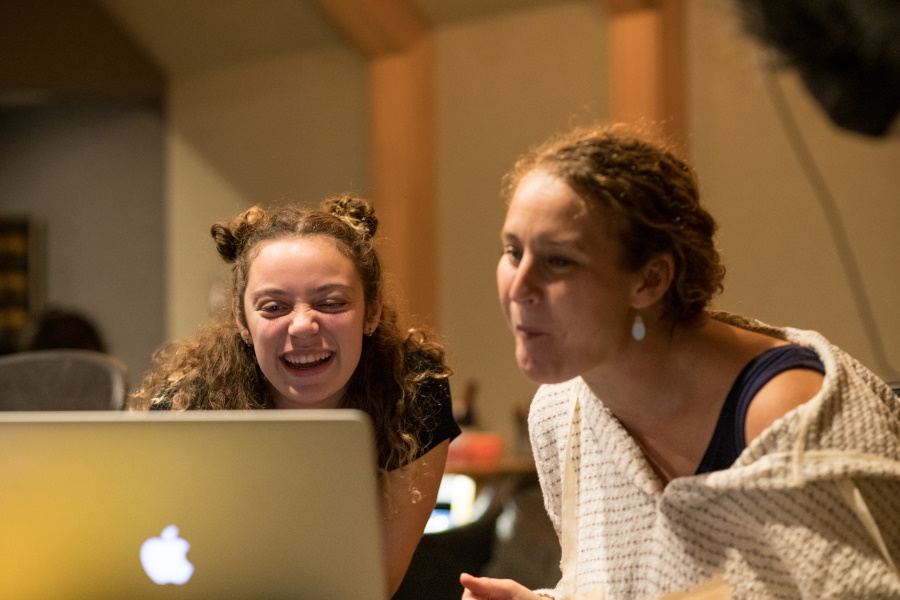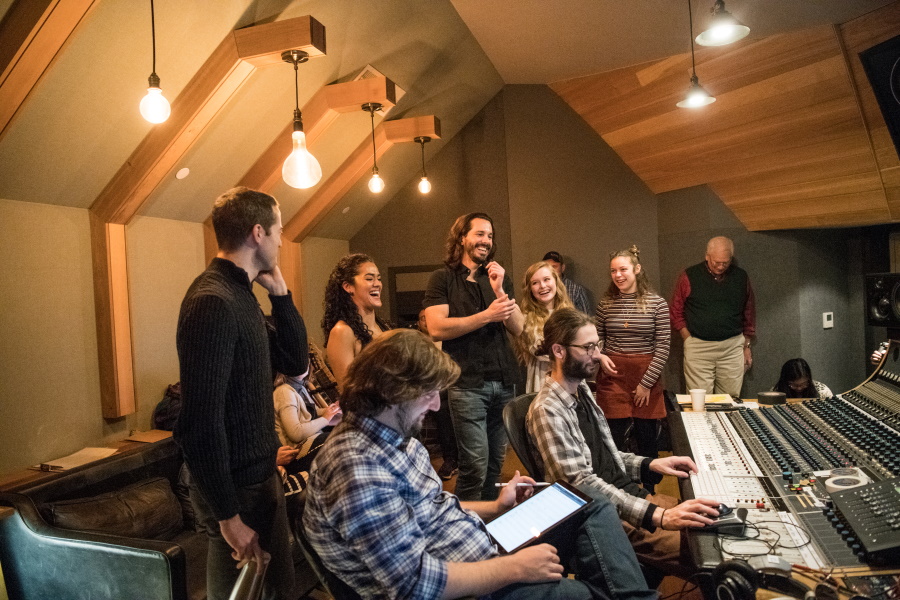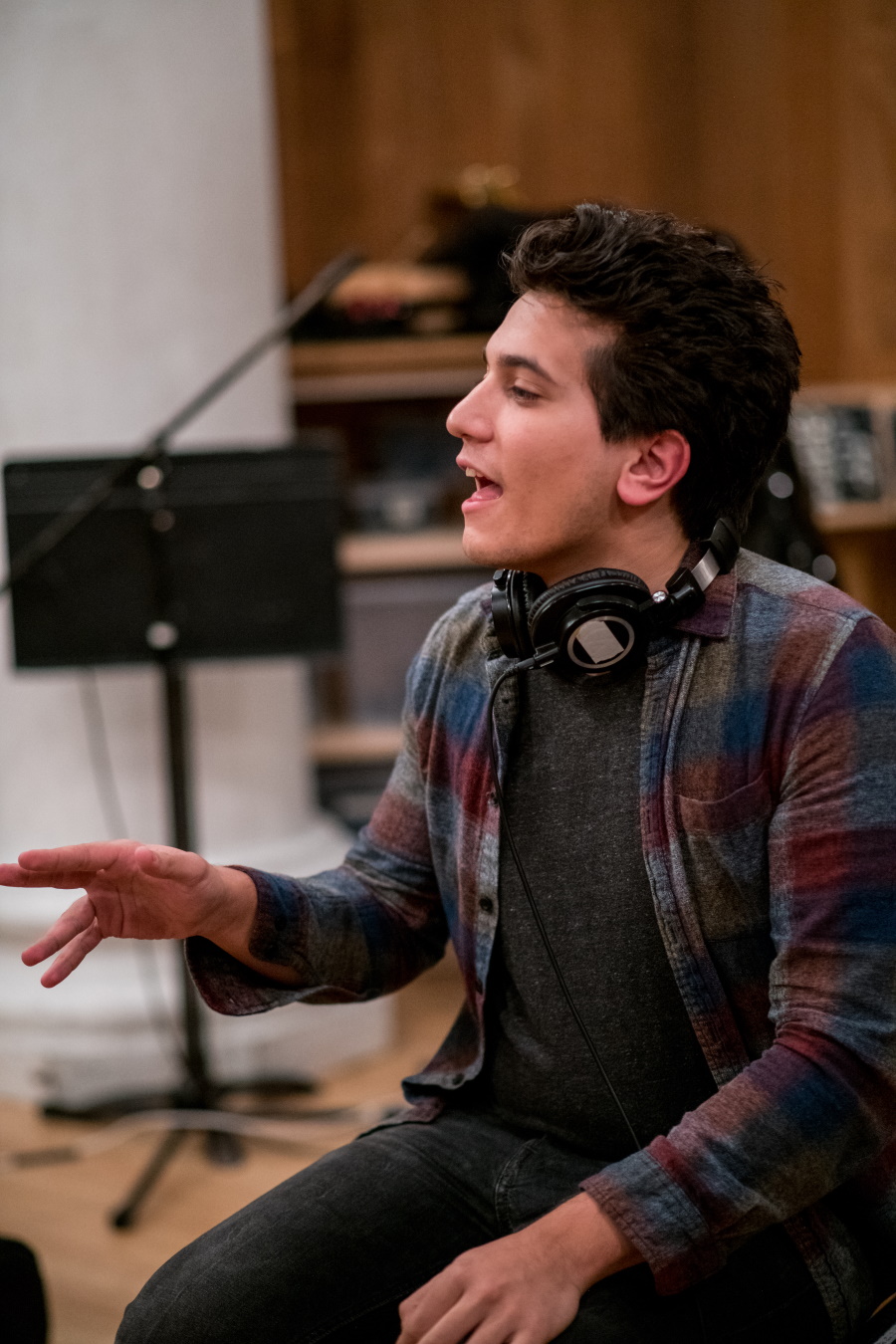“Can it be faster?” asked 15-year-old Sophia Schwaner, peering over the sound board at the recording studio. “Instead of singing ‘gra-ave,’ where both of the notes are equal value, can you do ‘gra-aaave?’” she suggested, elongating the second syllable. The high school sophomore from Staunton, Va., was holding court at Reservoir Studios in New York City, overseeing the recording of her original song “At Sea,” an epic ballad about the only woman recorded to have fought in the ancient Persian Wars. The half note turned whole, and Schwaner nodded in approval as vocalist Ashley Loren, currently in Moulin Rouge! The Musical on Broadway, made the change. “I like that!” effused Schwaner.
Schwaner is one of seven high school students whose songs were chosen for the 2019 Musical Theater Songwriting Challenge, a nationwide contest headed up by the National Endowment for the Arts and administered by the American Theatre Wing, the organization behind the Tony Awards. With additional support from Disney and Samuel French, the young composers receive mentorship, a recording session with professional musicians and vocalists in New York—which will be compiled in an album—and the publication of their songs. (In addition, the National Music Publishers’ Association S.O.N.G.S. Foundation has gifted the young writers with scholarship prizes.)
The contest, now in its second round after a pilot launch in 2016, received more than 200 submissions from high school students this year. “The NEA partnered with the American Theatre Wing to make it a national program,” explained Greg Reiner, NEA’s director of theatre and musical theatre, noting that students from 40 states submitted songs. (Next year’s goal is to reach 50 states and all the U.S. territories.)
The songwriting contest fits well into the Wing’s vast slate of programs supporting arts education and artists, which includes the Andrew Lloyd Webber Initiative, the SpringboardNYC program (of which I count myself a proud alum), the National Theatre Company Grants, and the Jonathan Larson Grants.
“This contest completes a broken part of our link, because it is a feeder to our Jonathan Larson Grants program,” said Heather Hitchens, president of the Wing. The Larson program awards prizes to emerging musical theatre composers, lyricists, librettists, or writing teams. The driving force of the grants is to “say yes” to artists. “The NEA is helping us to say yes at a very young age, and that’s really encouraging to a young artist.”
This year’s judging panel comprised regional theatre leaders, arts educators, and theatre professionals, including composer Andrew Lippa and producer Jennifer Ashley Tepper. Finalists were selected from six different regions across the country, and each was paired with a professional music director and a mentor. In August and September, the coaching teams traveled to finalists’ hometowns to workshop the songs for two days. The Wing looks to its own robust network of Tony winners and Larson recipients to judge the contest, mentor this next generation of musical theatre writing talent, and volunteer their time and talent to record the songs.
“The theatre community is an incredibly generous community,” said Hitchens. “It’s moving to see how united they are in supporting the next generation—they’re so excited to see young people get interested in theatre, and they want to help them.”
The coaching teams helped to hone each of the songs in preparation for the culminating event, the recording sessions, which took place over two days in October. Each of the six numbers had a designated time slot for bringing it to life with instrumentation and vocalists.
Having the mentoring teams work on the songs on the students’ home turf was a special experience for the students, many of whom were encouraged by school music and theatre teachers to submit songs for the contest. The teams workshopped the songs in high school theatre classrooms, auditoriums, and local studios.
“Having the mentors go out into the community opened everyone’s eyes up a little bit,” said Mary Anne Carter, the Arts Endowment’s newly appointed chairman. “One of our goals at NEA is to get out of Washington, D.C.”
On the day I visited Reservoir Studios, it brimmed with excitement as the young scribes from all over the U.S. were meeting each other for the first time. Beaming parents lined the wall. Carter and Hitchens were there to meet the finalists and sneak a peek at the recording process. A throng of musicians filed in, cellos and violins in tow.
“It’s surreal,” said 16-year-old Tessa Barcelo, from Andover, Mass. “Walking in and seeing all the amazing mentors and meeting person after person, all with incredible talent, that we’re going to be working with.”
When Abbie Van Nostrand, vice president of client relations and community engagement at Samuel French, announced to the room that the young composers will receive royalties on any sales of their sheet music, there were squeals of delight. “This is actually real!” one voice blurted.
Makai Keur, an 18-year-old from Franklin, Tenn., looked at home in the recording studio. Keur just started his first year at Berkelee College of Music in Boston, where he plans to major in either music composition or production. When it was time to record the instrumentation of “Charles’ Song,” the tune he wrote with his writing partner, Julian Watson (who was unable to attend the session), he took his place in the center of a circle of musicians and slowly turned to soak in the moment, a smile taking over his face.
The Songwriting Challenge gives the young artists freedom to steer the final product. “Something we pride ourselves in is our ability to say yes,” said Megan Jensen, the director of programming at the Wing. “So when the student says they want an ensemble, three lead vocalists, a string quartet, and a ukulele, we say yes!” Jensen, along with the Wing’s line producer, Jenny Gorelick, is tasked with putting together the teams of musicians and performers to bring the songs to life. When a student requested three backup vocalists at the last minute, Jensen and Gorelick quickly procured a trio of willing and excited performers up to the task.
“To have someone who does eight shows a week to show up on their day off today to sing a song at 9 a.m. for a high school student, and to watch the reaction it gets from both the student and the parents, and to see how the musicians feel in touch with the music—it just gives us so much hope for musical theatre,” said Jensen.
For her part, Barcelo was overjoyed to hear the magic made with her song in the studio. “It was such an amazing experience to hear what I’ve been imagining in my mind and trying to accomplish with just a USB plug and a computer,” she said.
But writers emerge with more than a demo track to submit for scholarships and college applications. It also offers the writers the opportunity to create a network of fellow collaborators and professional mentors.
Max Vernon, a Jonathan Larson Grant recipient, had little encouragement for their teenage love of musical theatre, so they jumped at the chance to be that voice for another young person. “I have this opportunity to let someone let their freak flag fly high and to stoke the fire of their love of theatre and say, ‘This is an incredible muscle you have that not everybody has—and we can develop that and you can turn this into something.’”
Emalee Flatness, 18, workshopped her song “Bring Him Back to Carolina” in the music room of her high school in Willard, Mo., with Vernon and music director Daniel Lincoln. “They are literally the coolest people ever,” she gushed over the phone in October. Schwaner, who worked with Vernon and music director Benjamin Rauhala, concurred: “Working with both of them was a completely eye-opening experience,” she said. “I was very nervous to have two professionals looking at my work, but they were so kind and supportive—and also honest.”
In addition to the professional partnerships formed, the recording session marked the start of new friendships among the finalists. Between recording sessions, a few finalists sank into the couch in the recording studio, a tangle of limbs embraced in side hugs. They had just met in person the day before, but the fast friends were already bracing for the goodbyes.
“It’s amazing to meet other high school students who are so passionate about the craft,” said L.A.-based Akira Sky, 16, about her new pals. “It’s never felt like a competition between us—it’s more of, ‘You sound amazing and you sound amazing and you sound amazing!’” Breezy Love, an 18-year-old from Winnetka, Ill., added: “It’s more a competition of who can come up with the best compliments.”
“Not only are we making a song happen, but we’re giving them networks,” said the Wing’s Hitchens. “That’s an equity issue in our field—who gets a network and who doesn’t? I think they’re going to be able to call on these mentors long into their careers.”
Another equity issue in the field: the dearth of female musical theatre composers, and the scarce representation of women’s stories onstage. That contest has aimed to address that disparity: Five of the six songs in this year’s competition are by young women. “It is very exciting to be part of that and to help seed that,” said Hitchens.
Midway through the day, a group filed into the recording booth to listen to the completed songs so far. First up was Sky’s doo-wop infused “I Don’t Know What Happened,” about a biracial teen magically transported back to 1969, where she meets her grandmother as a young woman and fears that her encounter will alter the future of her family. Next was Barcelo’s tune “Queen,” about a girl transported into the underwater kingdom in one of the stories she’s writing, where she meets a mermaid queen. Finally came Love’s song “Hangin’ On Life,” an autobiographical folk tune about struggling with anxiety and depression. When the songs concluded, Carter exclaimed, “Talk about female empowerment!”
Schwaner’s song “At Sea” could also be included in that camp. She was inspired to write her musical after she learned about the only known female to have fought in the Persian Wars. “Ancient history is very male-dominated, so it is inspiring to see a female step out of the norm in that time and do something outside of what women were expected to do,” she told me.
All the songs by the young writers—female power ballads included—point to the changing scope of musical theatre, in both form and style. From rhythm and blues to rock, folk to bluegrass, the selected songs span a variety of genres.
“There is a winner from each region, and you can hear the differences,” said the NEA’s Reiner. “Each song is so unique to where it comes from. You can hear that in the sound of the voices, the orchestration, and what they’re singing about. It’s really powerful to see the whole country represented that way in musical theatre.”
Added Hitchens, “We talk a lot about telling everyone’s stories, and the kinds of stories that we’re going to be able to tell with these young writers coming in—they’re writing about such interesting things.”
Watson and Keur’s winning tune, “Charles’ Song,” is from their musical about the Great Emu War of 1932, a battle between Australian farmers and a growing population of emus wreaking havoc on farm land after World War I. The friends, both recent grads from Tennessee, first learned about the event from a YouTube video.
“It started as a joke and grew into something that we both invested a lot of our time into,” Watson shared in an email. “It grew from seeds of friendship, and I’m really lucky to have had the people in my life that inspired developing the idea.”
Keur described the song as “folk, Americana rock.” A classically trained pianist, Keur was inspired to try his hand at musical theatre in part by a concert he attended of folk artist Anaïs Mitchell, of Hadestown fame.
Flatness is a fiddle player in a bluegrass band and was encouraged to write a musical after listening to the cast album of Bright Star, the folk musical penned by Edie Brickell and Steve Martin. Her own musical was inspired by the true story of her great-great-great grandfather, a member of the Union Army who was killed in battle.
The changing landscape in musical theatre has been evolving, in part thanks to some of the contest’s mentors. Just look at Vernon’s musical KPOP, an immersive show about Korean pop music that’s headed for Broadway, or Futurity by César Alvarez (another Larson winner), an indie-Americana musical that spans space and time.
“Everyone thinks we have a limited pie in the arts, right?” said Hitchens in the common area of the recording studio. “If you get this piece, I’m not going to get my piece. But if we make room, it’s an ever-expanding pie. We made room for César, and César has made room for other people,” she said.
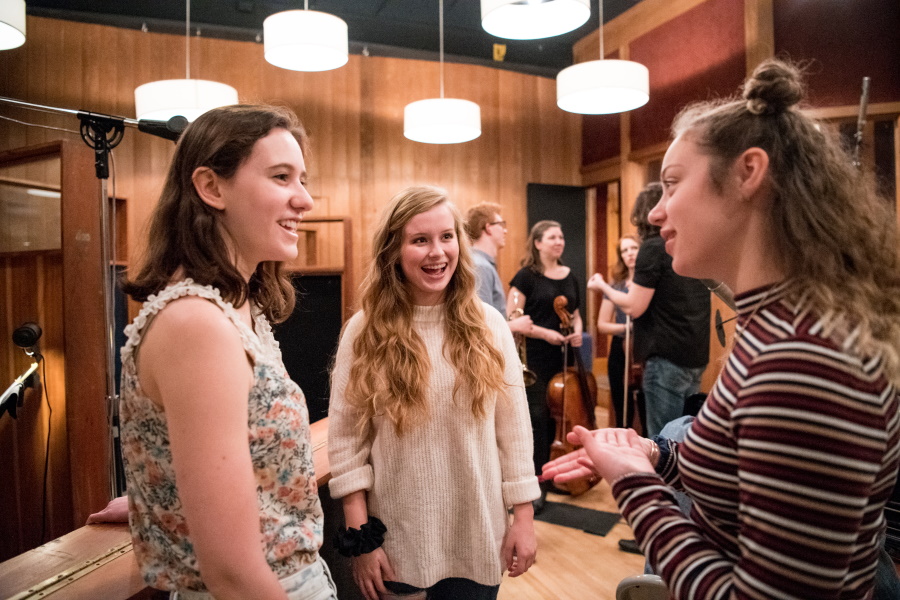
So what’s next? The Wing is hoping to partner with radio stations to share the winning songs. Though the 2019 Songwriting Challenge is complete, the young composers are taking their lessons from the workshops and continuing to polish their full musicals. No doubt the mentoring teams will be eager to hear how the stories develop.
Flatness, who just completed her first semester at Missouri State University as a music and history major, has applied what she’s learned to her songwriting. Her biggest takeaway from the experience: “Be descriptive,” she says. “That’s what I have been focusing on in my songwriting. To be specific, but not too specific.”
Schwaner, who is working on the second draft of her musical, is grateful to have gotten a taste of life as a professional musical theatre composer through the songwriting challenge. “It opened up my eyes to this career, living in New York, and working with these Broadway actors,” says Schwaner. “There is no one way to go about this career, and there is no one way to write a musical. You have to go with your intuition and kind of make your own path, which is scary but exciting.”
Keur is especially thankful for the guidance the NEA and the Wing are providing young musical theatre artists embarking on a precarious, scary path. “For us as high schoolers, wanting to write songs in this fashion, there was nothing for us,” he says. “There was nothing for us to do and nowhere for us to channel it.” That’s why last summer, Keur and his writing partner, Watson, worked with Keur’s local parks and recreation department in Tennessee to stage a public performance of their musical. “It is so nice to see that the [NEA and the Wing] are doing something for the people like us that want to do musical theatre.”
“We know that musical theatre and theatre in general has the power to move the needle and change hearts and minds,” says Hitchens. “So we’re just excited that these young people want to be part of that.”

